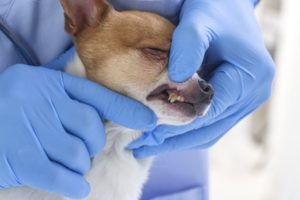
Poor dental health can negatively affect our fur babies, impacting their health, comfort, and everyday lives.
The month of February focuses on educating and promoting your pets’ dental health. Our pets’ dental health is just as important as our own. Poor dental health can negatively affect our fur babies, impacting their health, comfort, and everyday lives.
Pain/Discomfort
Dental disease can be extremely uncomfortable and painful for dogs and cats. It can appear in various ways, impacting your pet’s personality and behavior. However, every pet is different, and sometimes detecting oral pain in your pet can be challenging without paying attention to the signs.
Listed below are common signs of dental disease and pain in your pets that you should be aware of:
- Excessive drooling
- Whimpering
- Chattering teeth
- Slower eating/chewing
- Picking up food then dropping it
- Eating food on one side of their mouth
- Decreased interest in eating dry food and hard treats
- Resistance to having their face/mouth/head touched
- Decreased interest in chewing on toys
- Red/swollen/bleeding gums
- Bad breath
- Change in behavior
- Change in appetite
Lack of Appetite
As mentioned above, dental disease can affect your dogs or cat’s ability and desire to eat. If your pet is experiencing oral pain, it’s common for them to have a lack of appetite. Oral pain linked to dental disease can result in your pets eating less, chewing more slowly, or trying to eat foods in one bite. It can also cause them to chew on one side of their mouth, show a preference for moist foods over dry foods, or avoid and resist eating food altogether.
Systematic Spread of Bacteria
When your pet develops dental disease, bacteria accumulate within their mouths and oral tissues. Left untreated, that bacteria can spread to the bloodstream resulting in a systematic spread of bacteria. This can affect various areas of the body, including the heart, liver, and kidneys. Bacteria found in pets’ mouths with dental disease can be linked to bacterial heart diseases, such as endocarditis and valvular disease. Your pet’s liver and kidneys are also vulnerable to the effects of dental disease, causing them to function improperly.
All of this can be very scary, but luckily it is also very preventable! Keeping up with your pets’ dental hygiene and bringing them to one of our veterinarians for annual examinations can ensure that your fur baby’s teeth will stay pearly white and prevent serious diseases from developing.
Here at Mount Carmel Animal Hospital, We’ll Treat Your Pets Like Family!
Mount Carmel Animal Hospital has been serving the Northern Baltimore/Southern York community for over 30 years and is proud to be an independently operated, small animal practice committed to excellence in veterinary medicine and client service. From grooming to wellness services, along with Canine Life Skills Training Courses, and surgical procedures, we have the expertise that will best serve the needs of you and your pet. Contact us at 410-343-0200 and follow us on Facebook!
